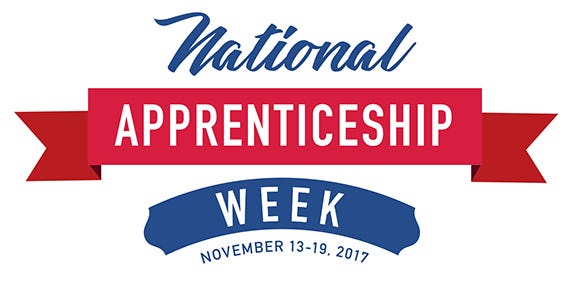Our economy is changing, and we must prepare our current and future workforce for the jobs of the 21st century. Members of the New Democrat Coalition have long-focused on job growth and workforce development, and this week many came together to recognize the importance of investing in apprenticeships and other training programs. To celebrate, Rep. Kathleen Rice reintroduced a resolution supporting the designation of this week as “National Apprenticeship Week” to recognize the important role that apprenticeships play in developing a well-trained and highly skilled work force, and to commend organizations and employers that actively support apprenticeship programs. To celebrate National Apprenticeship Week, we’re highlighting several New Dem-led bills and initiatives supporting apprenticeships and making them more accessible to all Americans.
A strong manufacturing sector is crucial for our nation’s economic growth and prosperity. A report commissioned by the Manufacturing Instituteestimates that nearly 3.5 million manufacturing jobs will open over the next decade, yet 2 million will go unfilled due to a shortage of talent. This shift has left, and will continue to leave, American workers behind without strategic investments in workforce development and skills training programs. Rep. Terri Sewell introduced the Workforce Development Tax Credit Act (H.R. 1190), a bipartisan bill that prepares our workforce for manufacturing jobs by providing federal tax credits for businesses that offer apprenticeship programs and additional tax credits for companies that hire apprentices.
“The Workforce Development Tax Credit Act encourages businesses to work with community colleges and universities to develop apprenticeship programs that will lead to more skilled workers. Emphasizing skills training will enable our country to maintain its competitive edge, and help bring more Americans into the middle class. I am proud to sponsor this bill with Bradley Byrne, my friend and fellow Alabamian, and I look forward to its passage,” said Rep. Sewell.
Rep. Rick Larsen introduced the Youth Access to American Jobs Act (H.R. 1050) to help students access good-paying American manufacturing jobs by creating partnerships between high schools, community colleges, and state apprenticeships. The bill emphasizes STEM-focused programs and creates a pilot program with a six-year pathway for students starting their junior year of high school, taking them through community college and into an apprenticeship.
Rep. Norma Torres introduced the Job Opportunities Between our Shores (JOBS) Act, which would authorize the Secretary of Labor to initiate pilot projects between local community colleges, state colleges, and workforce investment boards and advanced manufacturers in order to facilitate education and training programs in the field of advanced manufacturing. The revitalization of the manufacturing sector is essential to creating stronger economic growth and securing the financial future of working families.

We also need a tax code that works to encourages employers to work with community colleges and career and technical training schools to develop workforce training programs for skills that are in demand within their community or region. Rep. Annie Kuster introduced the Workforce Development Investment Act which would create a tax credit to encourage such partnerships and would also create a separate credit for the cost of direct training conducted as part of an educational partnership or licensed apprenticeship program.
Rep. Donald Norcross, an electrician by trade, also introduced the Opening Paths to Invest in Our Nation’s Students Act (529 OPTIONS Act) which seeks to make apprenticeship programs more affordable by allowing individuals enrolled in a registered apprenticeship to use money from their 529 Education Savings account, tax free, to pay for expenses associated with being an apprentice.
“An apprenticeship program shaped my life — taking me from Community College to construction work to Congress,” said Congressman Norcross, an electrician by trade. “Education and job training is not one-size-fits-all — and the rules for savings plans should reflect that truth. The four-year college experience is critical for many, but it’s not for everyone, so it’s important we allow 529s to be used in more than one way that helps shape our workforce. We need electricians and computer programmers, just like we need doctors and judges — and this bill levels the playing field for the students and future workers who start out in apprenticeships.”
The time is now for Congress to address the growing skills gap in the technology sector and expand and invest in tech apprenticeship programs. Rep. Moulton, Co-Chair of the New Democrat Coalition Future of Work Task Force, introduced the bi-partisan CHANCE in Tech Act to do just that. Specifically, this bill will allow industries, academic institutions, vocational and technical schools, and workforce development programs across the country to form partnerships and train Americans for the new economy.
And over half of New Democrat Coalition members sent a letter earlier this summer to President Trump calling for a robust commitment to apprenticeship programs. The letter, led by Reps. Cheri Bustos, Terri Sewell, Annie Kuster, and Donald Norcross, outlines the importance of apprenticeships and urges the administration to maintain strong levels of funding for apprenticeship initiatives across the country.
The New Democrat Coalition’s Future of Work Task Force hosted a series of public forums this summer on economic forecasts for the future, portable benefits, and skills training and workforce development. These forums led to the introduction of several aforementioned workforce development bills and over the next several months New Democrats plan to outline more policy ideas that will help prepare Americans for the workforce of tomorrow, today. In this rapidly changing economy, New Democrats will continue pushing for bills and initiatives to equip Americans with the training and know-how to fill open positions today and equip them with the skills they’ll need for the jobs of tomorrow.
